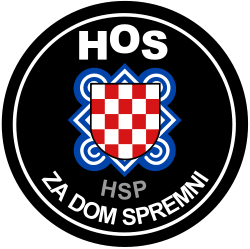

The pursuits of “forget the past, turn to the future” within Croatia’s halls of power have for at least two decades echoed ad nauseam. This past particularly being that of WWII past and post-WWII past – the conflicting coexistence of independent Croatia fighters (Ustase) and those who fought to keep Croatia as part of Yugoslavia (Communists). One would have thought that the 2017 creation of the Council for Dealing with Consequences of the Rule of Non-Democratic Regimes, sparked into being by the politically leftist or pro-communist driven controversy of the slogan “Za Dom Spremni” (For Homeland Ready) behind which slogan stood all fighters for Croatian independence, old and new, would actually deviate potential political earthquakes from political to historical level.
No such fortune in Croatia – regretfully.
The Council was created to work out a response to the question of how to deal with the enduring legacy of Croatia’s 20th Century non-democratic regimes: the WWII Ustasa movement with its legacy, albeit unrealised on a lasting level, of Independent State of Croatia, NDH, and socialist Yugoslavia, led by the League of Communists.
“The starting point is a clean break from all totalitarianism,” said Andrej Plenkovic, the prime minister in Croatia’s centre-right government said then in March 2017.
Those that want Croatia to become a truly functional democratic state that has well and truly rid itself of persistent and utterly damaging communist mindset rightly expected that the year zero of Croatian modern state, will be and remain the beginning of the Homeland war (1990).
But, such deserved expectations have proven to be painfully in vain. The Council has last week made recommendations for legal amendments that the salute “For Home Ready” (Za Dom Spremni) be made illegal but to allow the exceptional use of the ‘Za dom spremni’ when for instance marking anniversaries of 1990’s military units who used that slogan as part of their insignia during the Homeland War.
The Council failed to make recommendations that the communist Red Star be banned!
The current war for memory is a war for a dominant reading of the past – the tip of a very large iceberg, that has been standing in the way of Croatian “national reconciliation”. Franjo Tudjman, Croatia’s first president, juggled between the Red and the Black past of the WWII Croatia mobilising popular support for the independence from Yugoslavia. Today, Tudjman’s HDZ (Croatian Democratic Union Party) and its political leadership are pretending to seek heritagisation of his legacy, and emulate his methods in using the present to pacify the tensions from the past. So far, that unifying force that prevented further excursions into the past was a societal consensus on the Homeland war (1991-1995). Next to that, the EU future of the country – backed by all major political parties – was meant to bring Croatia closer to the West, and farther from the Balkans. Yet, after EU accession the country struggles in finding its own place in the family of European peoples, but also in leaving the past behind.
It fought a bloody defence from Serb/communist Yugoslavia aggression in early 19990’s, in Homeland War to leave the past behind and yet the powers that be keep churning up new ways to keep the past alive.
The Council’s failure to address the Red Star, communist totalitarian regime’s insignia in the same way as it treated the WWII salute used by the NDH devotees spells unrest and strangles any chance of true progress with Croatian national state reconciliation. It failed miserably at setting Croatia’s modern history right. It failed to direct the torchlight of a democratic future Croats fought for in 1990’s against communists and communist Yugoslavia aggression.
It failed to recognise and acknowledge the plight of the massive Croatian diaspora for true freedom from communist totalitarianism, which drove them away from Croatia post-WWII!
Prime Minister Andrej Plenkovic first mentioned setting up the Council for Dealing with Consequences of the Rule of Non-Democratic Regimes (totalitarian regimes) in December 2016 during a row over a plaque with ‘Za dom spremni’ installed in Jasenovac as a mark of the area where where a number of Croatian fighters were brutally murdered by the Serb aggressor in early 1990’s, situated near the site of the WWII concentration camp, where Jews, Serbs, Roma and Croatian anti-fascists were killed between 1941 and 1945.
Andrej Plenkovic made no mention at the time of the even more horrific and numerous communist crimes during the era and and the need to deal with those. That certainly send uneasy, fretting messages to all who had hoped that the Council would deal equally with the insignia and symbols of both WWII NDH and communist Yugoslavia.
They were right to fret for last week’s decision by the Council stinks with communist power still on the loose in Croatia.
Former communists did not want an independent Croatia, did not fight for it in any decisive or significant way but usurped the victory of others over communism to hold onto the idea that communism was somehow responsible for Croatia’s freedom and democracy! A revolting state of affairs. Utterly disregarding the horrors of the communist totalitarian regime.
After the final meeting of the Council last Wednesday, Prime Minister Andrej Plenkovic held a press conference along with the president of the council, Zvonko Kusic, who is also the president of Croatian Academy Sciences and Arts.
“Since the issue of the work of this Council was related to the concrete case of the HOS plaque, it’s clear… that this chant on that plaque is contrary to the Constitution of the Republic of Croatia, there is no dilemma there. But [Kusic] also acknowledged the fact that under strictly prescribed conditions it could be used in exceptional situations,” Plenkovic said, completely bypassing the fact that in announcing the formation of the Council in March 2017 an expectation was created to deal with symbolism of totalitarian regimes in general, not just the HOS (Croatian defence forces) memorial plaque in Jasenovac.
He rejected journalists’ suggestions that the government is not condemning the legacy of the Ustasa regime, but added that this refers to “a completely different context” – the use of the chant by the HOS in the 1990s war.
“‘Za dom spremni’ on the HOS’s coat of arms can be used only exceptionally, only in relation to those situations, sites or cemeteries, where HOS members were killed. This permission does not change the conclusion that the slogan is unconstitutional,” Kusic said.
After Plenkovic’s comment in March 2017 that the point of establishing the Council was to make “a clean break from all totalitarianism”, media have speculated about whether it would suggest a ban on both ‘Za dom spremni’ and the Communist red star, which was used by the Yugoslav anti-fascist Partisans and the Yugoslav People’s Army.
The European Court of Human Rights in 2008 ruled in favour of a Hungarian politician, Attila Vajnai, who was handcuffed and sentenced to a year’s parole in 2003 for wearing a red star, saying the ban violated his freedom of expression.
The ECHR established that the red star is still a symbol of the international workers’ movement and the fight for a more just society, as well as a legitimate symbol of the left that it used by some political parties in Europe.
Kusic also said on Wednesday that the red star and other symbols of Communism carry both positive and negative connotations, and that the link to the anti-fascist struggle is “undisputable”, but lawmakers can decide if some Communist symbols incite violence or hatred.
But Kusic conveniently disregarded the 2012 Knin, Croatia, court decision that ruled that the salutation “Za Dom Spremni” (For Home – Ready) has been known throughout the whole of the Croatian history, from the times of Nikola Subic Zrinski (1556 – 1566), and as such it does not signify any so-called “Ustashe attribute” with which it is burdened.
No doubt about it – lustration at all levels is called for. Otherwise not only will love for free Croatia perish completely under the communist thumb but with it all dignity for the humanness and justice in the “For Home and Country” mindset known and cherished always by those of the West whose democracies have developed exactly because of it.
Verу nicе post. I absolutely love tһis website.
Continue the good ԝork!